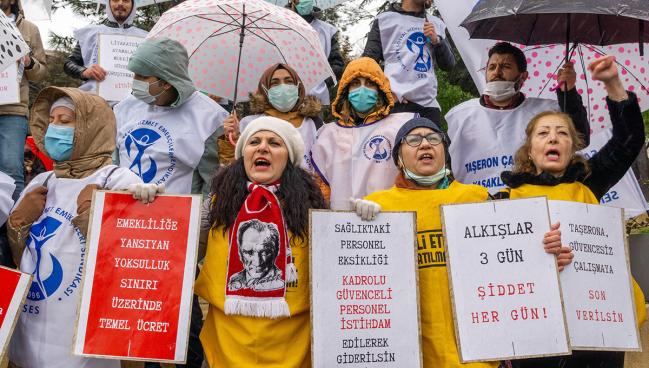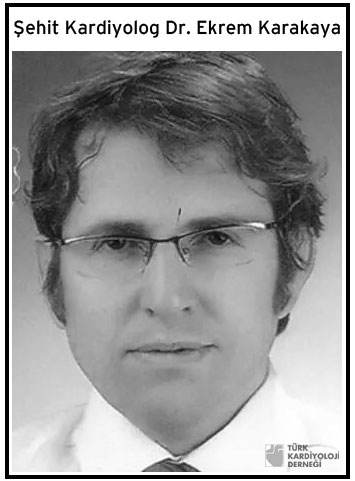Cardiologist’s Murder Prompts Countrywide Doctors’ Strike in Turkey
The hospital shooting of Ekrem Karakaya is the latest high-profile attack in Turkey, where assaults on physicians are soaring.

The cardiologist, Ekrem Karakaya, MD, of Konya City Hospital, was shot July 6 by Hacı Mehmet Akçay, a son of one of Karakaya’s patients, who died following complications of a STEMI.
“We’re angry!” reads a statement from the Turkish Medical Association (TMA), which puts the blame squarely on Minister of Health Fahrettin Koca, MD, and the ruling Adalet ve Kalkınma Partisi (AKP) government for failing to take a stricter stance on violence against physicians, including revisions to firearms legislation and hospital security.
“We have repeatedly warned the political powers against the expansion of this spiral of violence. We have repeatedly stated that violence in health is not an isolated phenomenon, that it is a social and political problem, along with its justifications,” the TMA statement stresses. “Due to the increase in armed attacks in health institutions, we have proposed legislative proposals. . . However, all our warnings were deliberately ignored, the source of violence detached from its social context, and the problem reduced to individuals. Those responsible have taken no steps other than condemning this specific situation.”

The Turkish Society of Cardiology also issued a statement on its website along with a photo of Karakaya that urged clinics to shutter their doors to nonurgent cases for 2 days and to post the photo and statement, explaining the reasons for closure. “Today, our only expectation is to use our professional competencies in peace,” the statement reads. “To be able to walk without looking back, not to be battered by the relatives of the patients, to continue practicing medicine without fear of life. To be on our duty until the last breath, until the heart stops. Not to be murdered in the polyclinic, in the practice, in front of the hospital.”
Media in the country were banned by Turkey’s Radio and Television Supreme Council from reporting on Karakaya’s murder, according to physicians who spoke with TCTMD, an allegation also reported by Balkan Insight. In the past, the AKP government has refused to make statistics on violence against healthcare workers public despite repeated calls and a lawsuit by the TMA.
Indeed, Turkish physicians allege that the government has repeatedly blocked efforts to improve physician safety and watered down legislation that could help keep doctors and allied health professionals safe.
Two cardiologists spoke with TCTMD about Karakaya’s murder on condition of anonymity, saying they feared reprisals if they were publicly named. Both blame the government, led by President Recep Tayyip Erdoğan, for intentionally turning a blind eye to the attacks on physicians and worse—encouraging patients and the public to “target” physicians with their frustrations.
Physician Exodus
The violence, on top of rising inflation and a worsening economy, has prompted an exodus of physicians from the country: nearly 1,400 last year alone and closer to 4,000 over the last decade, the TMA has said. New York Times coverage of the problem says that many more physicians are requesting certificates of good standing in order to emigrate.
One of the cardiologists who spoke with TCTMD said that physicians working in the public hospitals are expected to see 140 patients per day, amounting to approximately one new patient every 3 minutes, although other online sources put this closer to 5 minutes. “Can you imagine? All you see at the door is hate, hate, hate because the patients are all waiting and waiting, and you have no chance of solving their problems in 3 minutes. . . . I am really sad and hopeless,” the cardiologist said.
Messaging from the government maligning educated Turkish “intellectuals and elites” has only fomented frustration against doctors, they added, while a hobbled justice system has meant that any penalties for the perpetrators of attacks on healthcare workers are typically lackluster.
“The media is not free. The justice is not free. Doctors are not free. Our friends are afraid to talk,” the same cardiologist told TCTMD. “I am afraid to talk, as well, to be honest, because I have brilliant career. I don't want lose it and I don't want problems for my family.”
Under the AKP, universal healthcare has expanded, more than a dozen new hospitals have been built in major cities, and a private health network has been ramped up, catering to international patients and Turkish “VIPs”. Meanwhile, physician salaries have been scaled back and in some cases are only slightly higher than minimum wage in the public hospital system, making for drastically added workloads at a time of dwindling moral, all of which has escalated patient dissatisfaction.
Last week’s strikes were the latest in a series of walkouts by medical professionals that began in October 2021 amid rising violence. The number of doctors and allied health professionals physically and verbally attacked has passed 100,000, according to media reports.
During last week’s protests march, the TMA posted video to its Twitter feed of police clashing with physicians in the capital city, Istanbul. “Police attacks are happening one after another during our march from Capa Medical Faculty to the provincial health directorate in Istanbul,” the caption reads. “We warn law enforcement: You are committing a crime! Do not stand before our mourning, our anger; remove the barricades!”
İstanbul'da Çapa Tıp Fakültesi'nden il sağlık müdürlüğüne yapacağımız yürüyüşe üst üste polis saldırıları yaşanıyor.
— Türk Tabipleri Birliği (@ttborgtr) July 7, 2022
Emniyet güçlerini uyarıyoruz:
Suç işliyorsunuz!
Yasımızın, öfkemizin önünde durmayın; barikatları kaldırın!
📢 #YaşamakİçinGöREVdeyiz pic.twitter.com/9nPjdPSCXw
Both cardiologists who spoke with TCTMD said they expect “nothing will change” after last week’s 2-day walkout, predicting that more skilled specialists will leave the country while empty posts are filled by less-qualified physicians being actively recruited from Syria, Afghanistan, and Pakistan. Meanwhile, a petition by the TMA to have hospital security protocols enhanced with metal detectors and X-ray scanners has been rebuffed.
The cardiologists interviewed said that their understanding was that Karakaya’s patient was treated with primary PCI, but the case was converted to an emergency CABG following complications, which the patient did not ultimately survive.
“Tomorrow there is no guarantee for me not to be killed by one of my patient’s relatives, because I'm on call today,” one of the cardiologists said. “I have already performed three or four primary PCIs. There will no guarantee for my safety. [The government] cannot protect us. And they don't want to protect us.”
Shelley Wood was the Editor-in-Chief of TCTMD and the Editorial Director at the Cardiovascular Research Foundation (CRF) from October 2015…
Read Full Bio




Comments